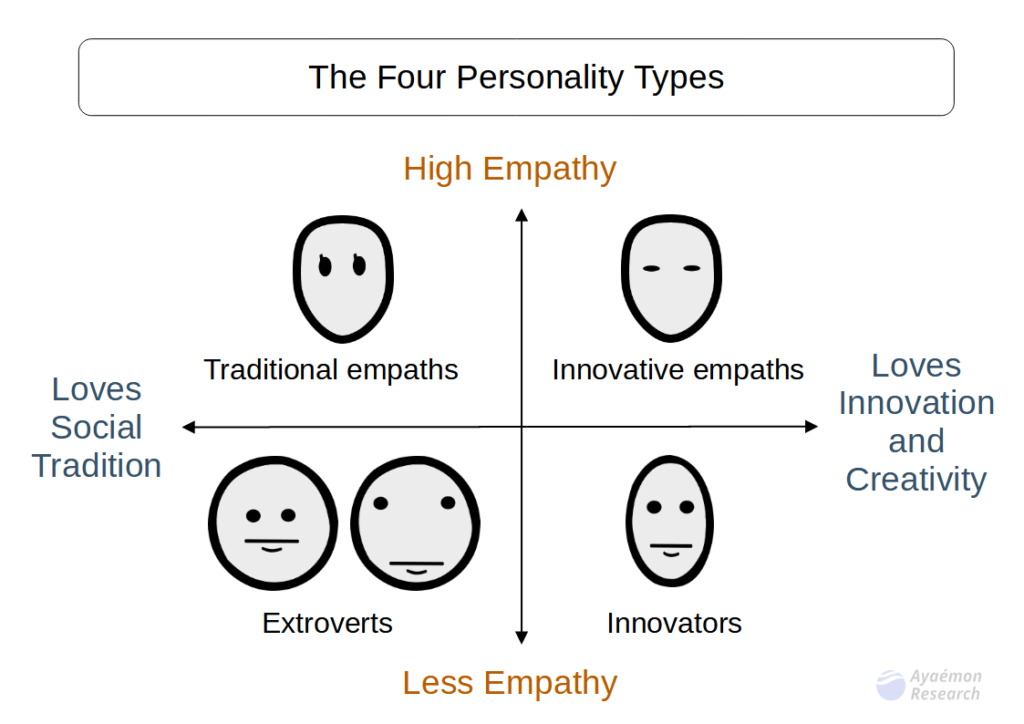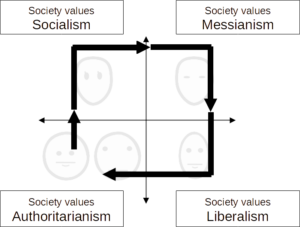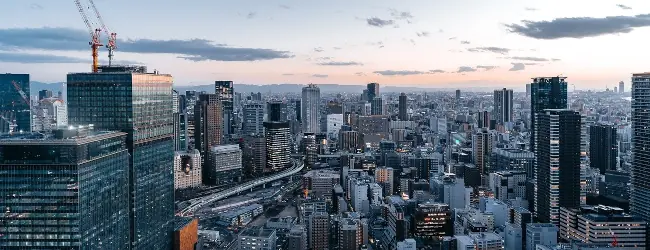In an earlier post (this article), I explained the cycle of contributable situations based on our personalities. We can also foresee our social future with it. Today, I will explain it.
How to foresee the future
Sometimes, we want to foresee the future because it tells us what preparation we need. There may be many confusions or anxieties about the future, especially these days. For example, there are conflicts or wars, and they are spreading. There is also high inflation and the decline of the economy. The gap between rich and poor is expanding. Those social confusions tell us the necessity of preparing for the future.
In such a situation, if we have a long-term perspective on social change, we can prepare for the future appropriately.

Today, I will introduce a social cycle to foresee the future. Of course, we don’t know the future exactly, but this wisdom might give us a hint to prepare for the future.
The four types of personalities
To explain the future, I will introduce the four types of personalities this time, too, because our personalities and society are inseparable. It is as follows:

- Extroverts: People who tend to follow social values. This is the majority. They have less of their own way of making decisions. When they have troubles, they follow traditional ways: their surroundings’ ideas or experts’ advice. That is why mainstream media often creates trends and affects the majority strongly. In other words, their movement determines social movements.
- Traditional empaths: People who like to help weak people through the support of their community. When weak people increase in their community, they stand up and try to change the community to protect weak people. That prevents the decline of society.
- Innovative empaths: People who like to help weak people through their creativity. When many people become poorer and the community cannot support them anymore, they stand up and provide new ways to help weak people. That prevents the extinction of individuals, even if the community is destroyed, and gives birth to new fundamentals of society.
- Innovators: People who like to improve the whole society with their creativity. After the social confusion settles, they stand up and provide new ways to progress in the community. That provides the whole society with life improvement.

In other words, those personalities have roles, such as maintaining, preventing a decline, preventing extinction, or prospering. They all have meaning to exist and are collaborating.
The longest-term social cycle
There are cycles in which those personalities affect the community. I will introduce the longest-term cycle below:

- The period of extroverts is the stable period. The gap between the rich and the poor is stable. Society tends to value authoritarianism: the majority live in a social class with rank and follow orders from the upper rank.
- The period of traditional empaths is when weak people increase partially due to destruction, and the community can support them. The gap between the rich and the poor expands. Society tends to value socialism: adding more restrictions to the majority to support the weak people.
- The period of Innovative empaths is when almost all people become poorer and the community cannot support them anymore. Society tends to value messianism: the majority wishes for someone who tells new ways of salvation against existing authorities that can no longer be used.
- The period of innovators is when the majority improve their lives. This is when the gap between the rich and the poor contracts. Society tends to value liberalism: adding more freedom and being borderless to cooperate widely.
We are in such a long-term cycle.

In other words, we humans try to survive and thrive by balancing our social styles. Sometimes, society values socialism, but sometimes liberalism. In places with a harsh environment, they might have more socialism to keep their population. On the other hand, in places with rich soil and a naturally increasing population, the majority might have more liberalism to prosper.
This tendency can apply not only to countries but also to our families.
They are neither good nor bad. That is why there will always be socialism, no matter how much we like freedom. That is also why socialism is never gone, even in the United States, such a country of freedom. Those personalities have meanings.
The opposite tendency tends to work negatively
In a period, the opposite personality tends to work negatively for society.
For example, during the period of the traditional empaths, when the gap between the rich and the poor expands, rich people can get poor people without effort. Rich people can waste the “disposable poor people.” That makes the rich richer and the poor poorer. That is a time to apply more socialism, so the community often leans toward socialism and adds restrictions.
On the other hand, during the period of the innovators, when the gap between the rich and the poor contracts, accelerating innovation makes whole people wealthier. That is a time to apply more liberalism, so the community leans toward free trade or a free economy.

The relationship between authoritarianism and the messiah faith is the same. The authority always hates and kills the new messiah to protect their power. On the other hand, the messiah always denies the traditional ways of authority that can no longer be used.
We have such differences in tendency depending on our environments, such as geometry, weather, the richness of the land, population, or surrounding countries. Then, the most well-balanced beings survive and thrive. Perhaps not only humans but all lives are in such a law of nature.
My prospects for the future
Worldwide, now seems to be the middle period of traditional empaths. As I mentioned at the beginning of this article, there are conflicts or wars, and they are spreading. There is also high inflation and the decline of the economy. The gap between rich and poor is expanding. These are the typical events of that period.
In other words, many regions seem to lean on further socialism for a while. It means that social confusion and conflicts will expand, and we could have more restrictions on our lives. Sometimes, we might have more destruction, and the power of society to support weak people might be weakened.

In this period, it might be better to be prepared, both materially and mentally. Perhaps trying to live with fewer things is better than trying to earn more because we will gradually not be able to rely on the support of society.
Then, if the traditional social systems collapse, the period of innovative empaths might come, partially or wholly.
I assume that a single period is around 20 years. I am talking about such a long term.
That is my prospect for the future. Of course, it could be wrong. If our communities can keep their power, the period of extroverts will follow and be stable again. However, that cycle tells us one of the ways to prepare for the future.
Conclusion
That is my logic for foreseeing the future in the long term.
Of course, we don’t know the future exactly, but this wisdom might give us a hint to prepare for the future.
Thank you for reading this article. I hope to see you in the next one.


